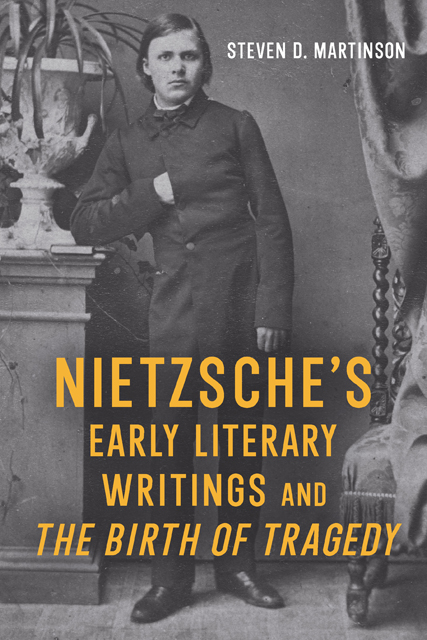1 - The Early Poetry
Published online by Cambridge University Press: 17 December 2022
Summary
Nietzsche's poetry contained in his literary estate (Nachlass) spans primarily the years 1854 to 1864, that is, from the time he lived in Naumburg through the time he graduated from the Schulpforta Gymnasium.1 I also examine several poems and musical compositions he wrote in Bonn, Leipzig, and Basel.
Nietzsche's search for self-understanding is manifest in his poetry, prose, and drama. A short poem written in 1858 captures Nietzsche's search for self:
Ein Spiegel ist das Leben.
Wonach wir nun auch streben.
Als erstes möcht’ ich nennen:
In ihm sich zu erkennen.
Life is a mirror.
Toward which we do strive.
I wish to be the first to aspire
To perceive in it my Self.
(NA I/1, 212).
Nietzsche wrote a number of poems to himself. For example, “Zum Geburtstag” (For My Birthday, 1859), which he wrote at the age of fifteen, illuminates some positive experiences in Pobles, the home of his maternal grandfather (NA I/2, 93–95):
Im Pfarrhaus zu Pobles
Ist lustiges Leben;
Bald nahen Verwandte
Bald liebe Bekannte
Von nah und von ferne
Und alle umgeben
Mit Freude u. Wonne
Wie blitzende Sterne
Des Hauses Sonne.
In the parsonage in Pobles
In the parsonage in Pobles
Joyous Life
Relatives soon visit
Then dear acquaintances
From near and far
And all surrounded
By joy and bliss
Like shining stars
The house's illumination [sun].
(NA I/2, 93)
The feeling of being truly at home is expressed in many of early Nietzsche's depictions of nature. Limbs of an oak tree spread out vibrantly, and birds sing (NA I/2, 94). Colorful images and the music of nature evoke a plenitude of emotions:
O hätte ich Lieder
Und frohe Gesänge
Daß es mir gelänge
In farbigen Bildern
Die Milde zu schildern
Die's Pfarrhaus v. Pobles
Beständig umhüllet
Und alle mit Frieden
Und Ruhe erfüllet.
O, if I had songs
And gladsome chants
That I should succeed
In colorful images
To depict the calm
That the Pobles parsonage
Continually surrounds
And all are filled
With peace and serenity.
(NA I/2, 94)
Divine, domestic locations also fill the poet with burning aspirations (“Mit feurigem Streben”) that rekindle the gleam that was lost when being away from home. In Pobles, Nietzsche found traces of his childhood that calmed his yearning for home, kindled images of youth, and cultivated truth and virtue. The poet also felt the enlivening and uplifting breath of the Lord.
- Type
- Chapter
- Information
- Nietzsche’s Early Literary Writings and The Birth of Tragedy , pp. 37 - 142Publisher: Boydell & BrewerPrint publication year: 2022

